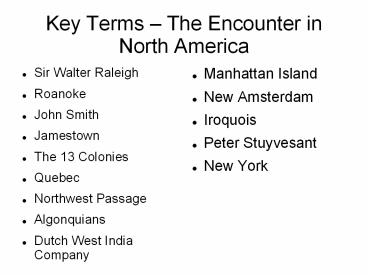Key Terms - PowerPoint PPT Presentation
1 / 15
Title:
Key Terms
Description:
Key Terms The Encounter in North America Sir Walter Raleigh Roanoke John Smith Jamestown The 13 Colonies Quebec Northwest Passage Algonquians Dutch West India Company – PowerPoint PPT presentation
Number of Views:86
Avg rating:3.0/5.0
Title: Key Terms
1
Key Terms The Encounter in North America
- Sir Walter Raleigh
- Roanoke
- John Smith
- Jamestown
- The 13 Colonies
- Quebec
- Northwest Passage
- Algonquians
- Dutch West India Company
- Manhattan Island
- New Amsterdam
- Iroquois
- Peter Stuyvesant
- New York
2
Sir Walter Raleigh
- Sir Walter Raleigh ? English colonist sent to
America in 1585. - He would start the first English colony known as
Roanoke - His attempt to colonize Roanoke Island would turn
out to be a failure
3
Roanoke Island
- Roanoke ? first English settlement, located off
of the coast of North Carolina. - Would be a failed colony, Sir Walter Raleigh
would return to England and upon his return to
Roanoke, the colony was devoid of settlers.
4
Jamestown, the First English Colony
- The English would make a second attempt at
colonizing territory in America. - This second expedition would be backed by James I
and would land in what is modern day Virginia. - The colony would be known as Jamestown,
established in 1607.
5
John Smith and Jamestown
- John Smith ? was the colonist responsible for the
establishment of the Jamestown settlement. - Colonists barely survived the 1st winter and
would have probably died without the help of the
Native Americans.
6
Native American Attributes/Qualities
- Native Americans lived as hunters and gatherers
they established no empires - They believed in collective sharing of the land
rather than private ownership. - They were engaged in many rivalries. An example
would be the dislike the Iroquois had for the
Algonquians. - Their behavior and choices would help dictate the
fate of the colonizers that were arriving year
after year.
7
The Thirteen Colonies
- Over time, after the success (after much waiting)
of the Jamestown settlement, more settlers came
from England and established their own colonies
across the Eastern American Seaboard. - These territories collectively were known as the
13 Colonies.
8
Differences Among the Colonies
- Massachussetts Bay Company ? landed in Plymouth,
established a religion based colony - Rhode Island ? established by Roger Williams,
sought to create a colony that allowed religious
tolerance. - Pennsylvania ? established by William Penn,
acquired as an inherited debt from the king of
England. - Maryland ? named after Mary I of England, one of
the first plantations to make use of the tobacco
crop.
9
The French in North America
- Samuel de Champlain, while charting the Canadian
coastline, created the first French colony. - Quebec ? first French colony, established in
1608, located north of New York State.
10
Qualities of Quebec
- Quebec was established as a trading post while
other explorers looked for the Northwest Passage. - Northwest Passage ? route that cuts through
America to reach Asia. - Quebec became a fur center.
11
Native American Relations
- The French traded constantly with the Native
Americans for furs. They would usually trade
guns, knives and other items. - The French were taught how to survive in Quebec
by the Native Americans - The French would have poor relations with the
Iroquois this was due to the French removing
them to take over fur-trapping areas. - Iroquois would work against the French while
other Native Americans (Algonquians and Hurons)
would support them.
12
The Dutch in North America
- Dutch West India Company would finance an
expedition into New Netherlands in 1624. - Dutch would arrive in New York State and split
into three areas The Connecticut River, the
Delaware River, and the Hudson River.
13
New Amsterdam
- Sixty more families would arrive a year later and
establish New Amsterdam on Manhattan Island. - New York City would later grow from the
beginnings of Manhattan Island.
14
The Iroquois and the Dutch
- Iroquois ? Native American tribe that partnered
with the Dutch in settling New York State - Dutch would have issues with the Algonquians over
use of land which would lead to open hostility.
15
The Loss of New Amsterdam
- In 1664, Charles II would send ships to retrieve
New Amsterdam under the claim that John Cabot
discovered it first. - Peter Stuyvesant, the Dutch leader surrenders
reluctantly and New Amsterdam becomes New York.































